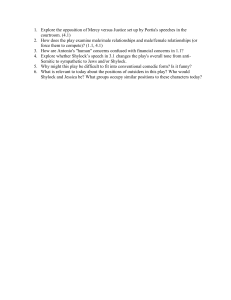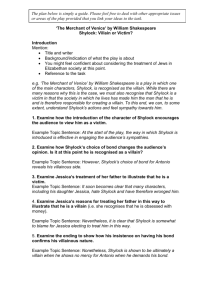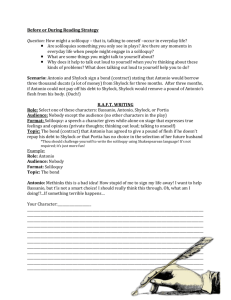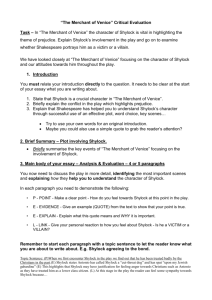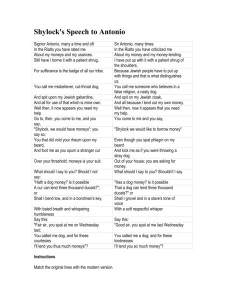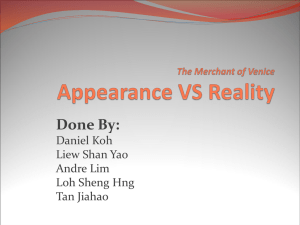Is Shylock a victim of a villain
advertisement
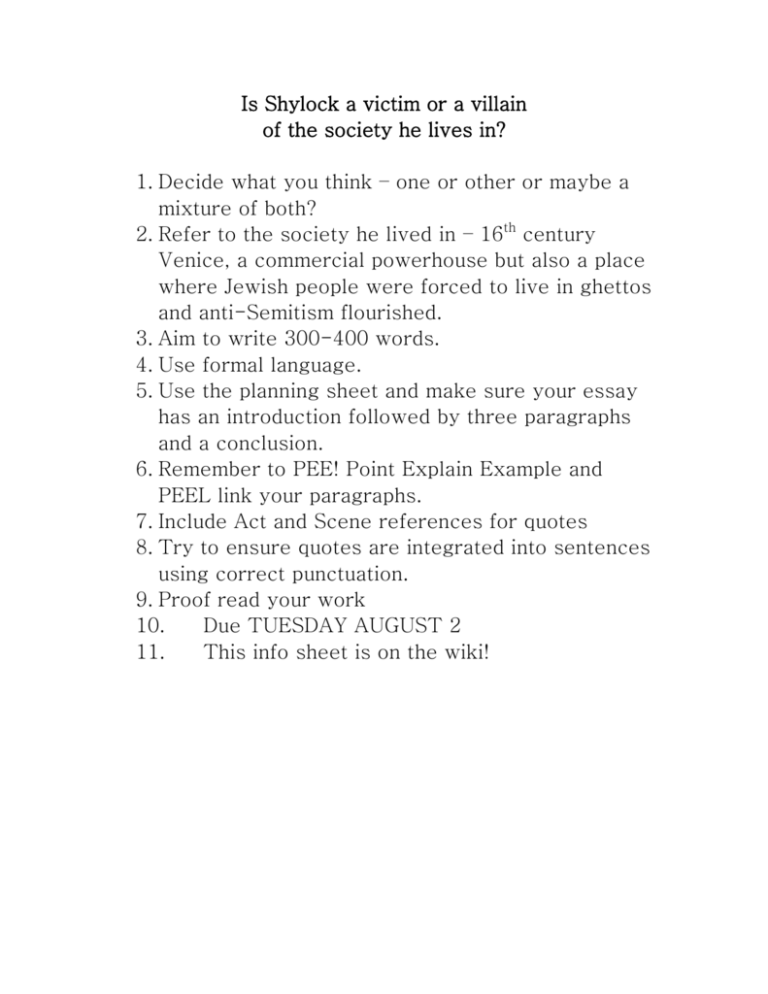
Is Shylock a victim or a villain of the society he lives in? 1. Decide what you think – one or other or maybe a mixture of both? 2. Refer to the society he lived in – 16th century Venice, a commercial powerhouse but also a place where Jewish people were forced to live in ghettos and anti-Semitism flourished. 3. Aim to write 300-400 words. 4. Use formal language. 5. Use the planning sheet and make sure your essay has an introduction followed by three paragraphs and a conclusion. 6. Remember to PEE! Point Explain Example and PEEL link your paragraphs. 7. Include Act and Scene references for quotes 8. Try to ensure quotes are integrated into sentences using correct punctuation. 9. Proof read your work 10. Due TUESDAY AUGUST 2 11. This info sheet is on the wiki! In William Shakespeare’s play The Merchant of Venice, Shylock is portrayed as a greedy, spiteful man who is financially and emotionally ruined after losing a trial against his arch enemy the Christian merchant Antonio. Despite his short comings, Shylock is clearly a victim of the society he lives in who becomes revengeful after years of ill-treatment from his fellow Venetians. Shylock is a Jewish money lender (r usurer) who lives and works in sixteenth century Venice. Shylock and other Jews were considered a necessary evil in the bustling commercial hub. Although it was against the Christians’ belief to lend money for profit, they happily borrowed money to support their lavish lifestyles. The Jewish people were tolerated for the service they provided but at the same time were treated as second class citizens. When Antonio needs money so his friend Bassanio can marry a wealthy heiress, he approaches Shylock. Even as they are working out the terms of the bond, Antonio is disrespectful of Shylock saying, “The devil can cite Scripture for his purpose” (Act 3:1). Shylock also claims that Antonio has called him names and spat on him but still agrees to do business with him. In Act 2:4, Shylock’s only daughter Jessica elopes with a Christian named Lorenzo. She adds insult to injury by stealing from her father. Later when Solanio and Salario are gossiping about Shylock’s reaction to his loss, they make fun of him and refer to him “as the dog Jew” (Act 3:1). The loss of Jessica seems to be a turning point for Shylock who becomes fixated on getting his bond of a pound of flesh from Antonio. Shylock explains his reaction by saying, “the villainy you teach us do we not execute?” (Act 3:1). The hypocrisy of the Christians is also evident in the climactic trial in Act 4:1. The Duke and then Portia repeatedly ask Shylock to show mercy to Antonio. When he refuses, Portia (dressed as a male lawyer) then uses the law against Shylock, denying him of his bond, stripping him of half his estate, forcing him to convert to Christianity and ensuring Jessica and Lorenzo gain what remains of his estate when he dies. It seems that the mercy they expected of Shylock is not returned. Shylock is left a broken man who is silenced into submission. In summary, Shylock is a victim of constant (and centuries old persecution). He is spat on, verbally abused and even has stones thrown at hm. The loss of his daughter Jessica sparks an almost fanatical need for revenge. Sadly his poignant plea for tolerance in Act 3:1 where he memorably asks, “If you prick us do we not bleed?” falls on deaf ears. As history painfully shows if unchecked the type of anti-Semitism suffered by Shylock can have horrific consequences. Sufferance is indeed the badge of his tribe.
